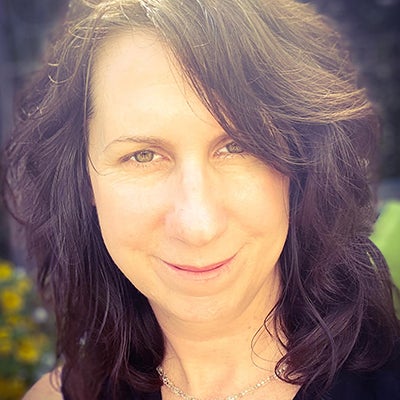- Associate Professor
- Phone: 401.874.5556
- Email: jjjones@uri.edu
- Office Location: 175D Swan Hall
Biography
Professor Jones studies Romantic-era literature and culture (1770-1840) with particular attention to its broad historical and critical contexts. Professor Jones is persistently drawn to trans-historical and cross-disciplinary intellectual histories, as well as to the subject of historicity itself, particularly with regard to aesthetic form and experience. Sublimity, immersion, technology, education, and consolation are key terms of her research. Whether she is concerned with the limit experience of the sublime; the absorptive experience of immersion; the ongoing outcomes of living with loss, pain, and grief; or the metaphorics and practice of translation, Professor Jones’s work is attuned to the contexts and perspectives of embodiment, developing a sensory history across a range of disciplines as well as across time. Professor Jones returns again and again to texts that wrestle with desires for the past, that explore the past through a variety of perspectives ranging from the present to the future, that engage with the tricky and fraught task of memorialization, and that question how traditions, and the aesthetic and technical forms associated with them, reconfigure across time.
Professor Jones is the editor of an essay collection entitled The Sublime and Education. She has served as associate editor of an issue of European Romantic Review. She is the author of articles and reviews published in journals such as Studies in Romanticism, The Wordsworth Circle, Neophilologus, Praxis, The Keats-Shelley Review, and Eighteenth-Century Life. Two of Professor Jones’s peer-reviewed essays have earned national recognition for excellence.
Professor Jones’s monograph, currently under review with Palgrave Macmillan, is entitledWordsworth’s Chaucer: Romanticism, Translation, and the Poetics of Consolation. The argument of this book is that consolation is a key term through which to reassess William Wordsworth’s writing and its critical legacy. The overturning of Matthew Arnold’s 1879 epithet of Wordsworth as a restorative poet has for decades fueled a counter-current that values Wordsworth’s writing precisely to the degree that it disrupts or overcomes the consolatory energies in which Arnold placed such value. Professor Jones explores the ways in which criticism has depended on Arnold’s own definition of consolation, eliding the complex theory of consolation Wordsworth develops in his writing as well as the complex ways consolatory energies continue to unite critics and their readers. To redress this problem, she analyzes the term consolation as a site of critical inquiry in its own right. The theoretical ground of the book is a productive analogy between its key term, consolation, and its premier object of study, Wordsworth’s Chaucer translations. Drawing on, expanding, and tracing out a poetic lineage that includes Boethius’s sixth-century treatise The Consolation of Philosophy, the archive of this book puts Wordsworth’s four Chaucer translations into dialogue with some of his most influential original short lyrics.
Professor Jones aims to train students to master a discipline, English literature. In the course of that process, she aims to train students to view themselves as vibrant contributors to the world in which they learn and live. Professor Jones strives to give every student a voice in class, a voice that becomes more powerful and dynamic over time. Professor Jones’s students work hard to master the traditional critical essay form; to become comfortable leading and contributing to class discussion; how to ask questions, develop ideas, and pursue those ideas in venues as informal as journal-writing or as formal as a research paper; participate in oral debates on major issues studied in class; design creative projects in a variety of media; and memorize and recite poetry. Drawing on her extensive training in contemporary culture, Professor Jones’s courses also ask students to think critically about, as well as to participate practically in, contemporary digital culture and its relations to literary history and humanist thought. In 2014, Professor Jones was awarded the URI Foundation Teaching Excellence Award.
Professor Jones offers courses at every level of collegiate and post-collegiate study, from the 100-level to 600-level. She is also devoted to teaching in the Honors Program, where she has offered electives, GE courses, and has served as a Major Professor for the Honors Thesis. As a few examples of recent courses, Professor Jones has taught English 110, in which students focused on the relationship of humans and animals across a range of genres. She has taught English 263, which introduces students to the study of poetry, both its forms and its subjects. She has taught a series of 300-level courses on British Romanticism, such as Human Rights and the Romantic Individual: Revolutions of Mind and Romanticism and the Idea of Italy. She has offered a variety of 400-level courses, studying specific authors and their preferred genres intensively, including William Wordsworth, Samuel Taylor Coleridge, Percy Bysshe Shelley, Mary Wollstonecraft, and Jane Austen. The past few graduate seminars Professor Jones has offered include English 660 (special topics): Romanticism and Judgment: Rhetoric, Imagination, Politics, Ethics and English 610 (historical periods): Romanticism, Secularism, and the Idea of Consolation.
Before joining the faculty in English at the University of Rhode Island, Professor Jones was a Woodrow Wilson Postdoctoral Fellow in the Humanities at the University of Colorado, Boulder. A California native, Professor Jones earned her M.A. and Ph.D. from the University of California at Santa Barbara, and her collegiate training began at the University of California at Santa Cruz, where she earned College Honors and Summa Cum Laude in Theater Arts (with a concentration in film production) and Modern Literary studies.
Research
British and Continental Romanticism; Critical Theory; Poetry and Poetics; Aesthetic Theory
Education
- Ph.D., University of California, Santa Barbara
- M.A., University of California, Santa Barbara
- B.A., University of California, Santa Cruz

